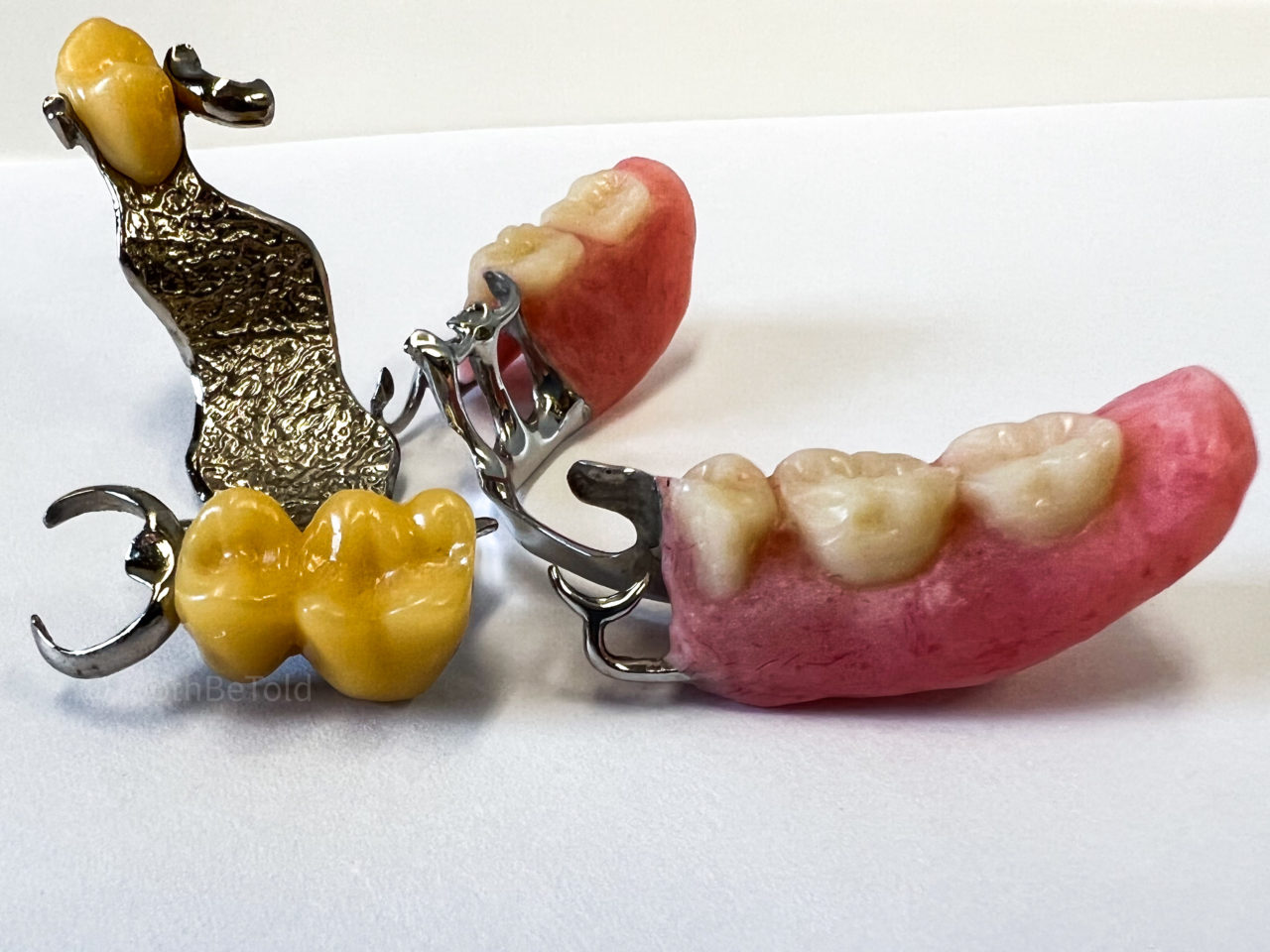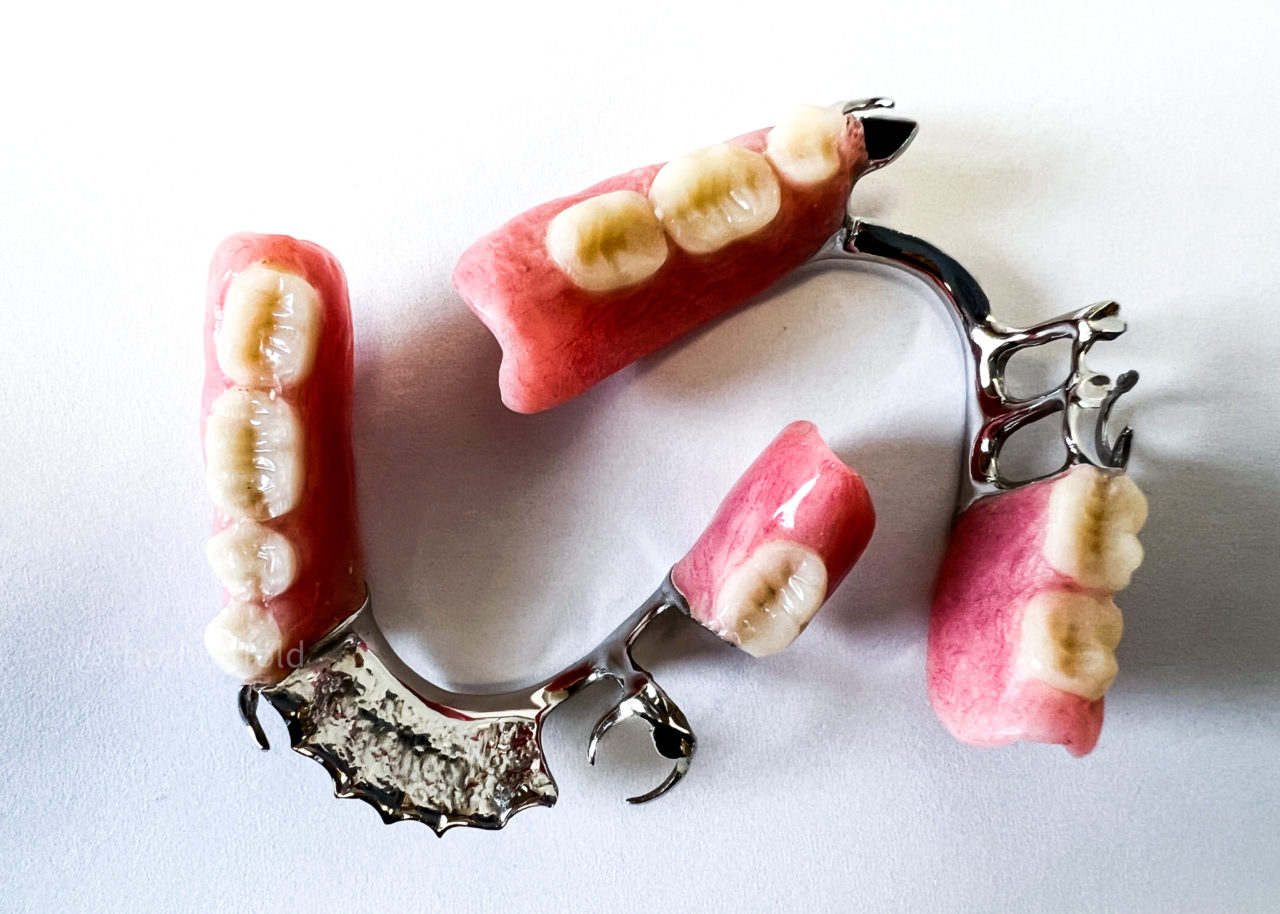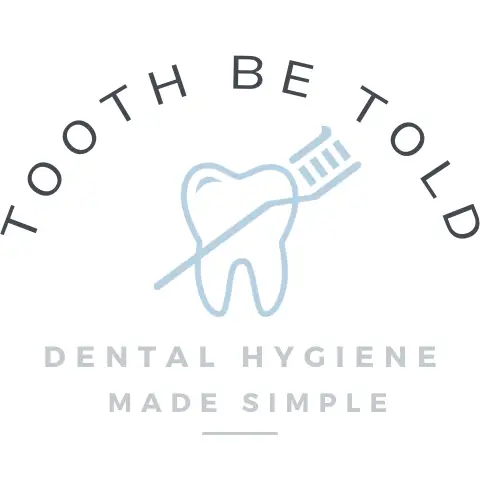White teeth are a common subject brought up by my patients in the dental chair, including those with my patients who have dentures. Sometimes they find their partial dentures don’t match their natural teeth or want their dentures to be more white.
Dentures cannot be whitened as the colour cannot change after the material is cured. Dentures can gather surface stains and calculus that can discolour the teeth and make them appear stained. The surface stain can be removed using a denture soak or by a dental professional at a dental office.

In this post, I go over why you cannot whiten dentures to change the colour of the materials, types of stains, how to remove stains from dentures at home, and how preventing stains is the best course of action. All the information is what I tell my patients in my dental chair!
Why can dentures not be whitened?
Dentures are made of many materials, including acrylic, porcelain, and composite resin. When the dentures are made, the colour of the teeth is already predetermined. After the teeth are set into the denture, they can have pigments painted on the teeth to take on a more natural look.
But once the colour has been chosen upon making the dentures, it cannot be changed.
Often I have been asked if hydrogen peroxide or other over-the-counter teeth whitening products will whiten the dentures.
Hydrogen peroxide or any teeth whitening product will have no effect on the denture because they are not natural teeth, and the active ingredient cannot penetrate and oxidize the colour of the denture teeth.
And other at-home whitening tricks that will not whiten teeth include;
- household bleach
- magic erasers
- household cleaning products
- natural teeth whitening products
- whitening toothpaste (never use any type of toothpaste on a denture because they are abrasive)
- hot water
- mouthwash
Using non-denture-safe products can take off the outer polished layer
When dentures are made, the final step before completion is to polish the material to make the surface super smooth. This step is imperative to prevent bacterial adhesion, calculus (tartar) build-up and stain accumulation.
Products used on dentures that are not made for dentures can remove the polished outer layer and make the denture more susceptible to stain.
Read Now: Receding Gums? Best Electric Toothbrush and Head to Use!
How to remove surface stain from dentures
You must be very careful about what products you use to remove surface stains from dentures. Using the wrong product can damage the dentures, causing them to become scratched, warped or decrease the strength of the material, making them more susceptible to damage.
To remove the surface stain on dentures, soak the dentures in a denture cleaner overnight to soften deposits. After soaking, use a denture brush to remove the surface stain and clean the denture. Repeat daily for the best results and see a dental professional for more advanced cleaning options.
As I briefly mentioned earlier, if the surface of the denture is damaged by using the wrong product, it can promote more stain and calculus accumulation leading to an increased amount of bacteria, which can negatively affect your oral health and cause bad breath and decreased confidence.
Taking proper care of your dentures is important to ensure their longevity and integrity. Dentures are expensive and a long, tedious process to make that you want to postpone as long as possible.
Why proper denture care is important; stain and flabby tissue prevention
It is important to remove dentures for more than 8 hours every day during the night as you sleep. Not only to keep dentures clean and prevent stains but also for the health of your gum tissue and mouth.
Denture cleaners will help kill off bacteria on the dentures and act as an anti-fungal and loosen up immature calculus (tartar) that is starting to calcify onto the dentures.
Whenever I have a patient that sits in my dental chair, I get them to take out their dentures so I can inspect them, clean them if need be, and assess the tissue in the mouth.
Read Now: How to Clean Your Mouth When You Don’t Have Teeth
If dentures are worn for too long, the tissue underneath does not get exposed to the air, and this can cause long-term issues.
It is like wearing a band-aid and never taking it off. We know what happens to the skin when this happens.
If the tissue underneath the dentures does not get a break, it can cause the gum tissue to become flabby and cause the denture to not fit as well. It can affect the suction and fit and cause the denture to become loose and ill-fitting.
What is flabby tissue from dentures?
Flabby tissue comprises hyperplastic and fibrous tissues that replace the alveolar bone ridge. Flabby tissue occurs with extended denture wear over time and can affect how dentures suction and fit in the mouth. Having flabby tissue can make it difficult to take impressions to create a new denture.
Flabby tissue formation can be prevented or delayed by taking dentures out at night for at least 8 hours at a time.
Read Now: The Correct Way to Use an Oral-B Electric Toothbrush
Dental-hygienist-approved denture products and steps of care
Dentures should always be wet. You don’t want to leave them out to air dry. If they are not in your mouth, they should be soaked in a glass/denture cleaning case full of water and denture cleaner.
However, the type of cleaner you use depends on if your denture has metal or not. Please check to make sure to use the proper denture cleaner if your denture has metal because using the wrong one can damage the metal with extended use.

If you have a partial denture that has metal, make sure to purchase th denture cleaner that is intended for partial dentures.
The best product is Polident Partials Denture Cleanser Tablets  (Amazon link) which will prevent the metal from corrosion. It is the best product on the market and what I recommend to my patients.
(Amazon link) which will prevent the metal from corrosion. It is the best product on the market and what I recommend to my patients.


If you have a denture with no metal, the regular Denture Polident tablets will work best.
“Polident Denture Cleaner tablets have a non-abrasive formula, so they clean without scratching, leaving fewer places for odor-causing bacteria to grow”
Here is the link on Amazon for the Polident Overnight Whitening Denture Cleaning tablets . Again, Polident is the best brand to buy; they have been thoroughly tested and vetted for safety and effectiveness.
. Again, Polident is the best brand to buy; they have been thoroughly tested and vetted for safety and effectiveness.


You will also want to have a proper denture brush (this is the one I give out to my patients ) and a denture cleaning case, like this one on Amazon.
) and a denture cleaning case, like this one on Amazon. I like this denture case because it is dishwasher safe, and easy cleaning of the case is also important to prevent the overgrowth of bacteria and fungus.
I like this denture case because it is dishwasher safe, and easy cleaning of the case is also important to prevent the overgrowth of bacteria and fungus.
I hope this information helps you and you can achieve stain-free dentures!
All the best,
Holly 🙂
